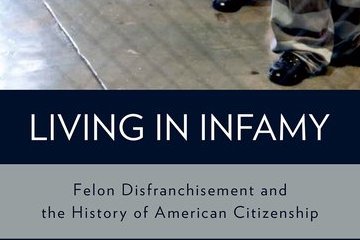Editor’s Note: This issue goes to press in the wake of much-watched elections in several southern states. The Docket asked historians to share commentary on resonances between their own research and the past election. Professor Holloway is reflecting on the decision by Florida voters to restore voting rights to most residents who have been convicted of felonies, in light of her scholarship on the history of convict disfranchisement.
Last month voters in Florida amended their constitution to allow for the automatic restoration of voting rights to most ex-felons who have been released from prison and completed court supervision. Prior to this referendum Florida led the nation in the number of people disfranchised for prior convictions. Now Florida is another kind of leader: the second state to enfranchise ex-felons through a popular ballot. This historic achievement is an important step in reversing a project designed with racial and partisan intentions that dates back to Reconstruction.
In the late 1870s Florida was one of many southern states that expanded disfranchisement for crime by denying the vote to those convicted of misdemeanor larceny. While disfranchisement for major crimes had been common practice across the nation, toward the end of Reconstruction white southern “redeemers” intent on limiting the newly-won voting rights of black men changed these laws to include misdemeanor theft. Affirmed in Florida through an Attorney General’s opinion and a state supreme court case, State v. Buckman, disfranchisement for misdemeanor larceny swept across the state, used alongside literacy tests and poll taxes to limit the vote of African American men.
White Democrats in Florida found disfranchising for minor theft to be particularly easy because of Florida’s vast “informal” court system. “Justice of the Peace Courts” (sometimes referred to colloquially as “wiregrass courts”) operated in fields and crossroads across the state to try minor crimes. Often overseen by someone with no legal credentials, these courts kept no records but could convict on the fly with little evidence and scant due process protections.
A congressional investigation into election irregularities in 1881 unearthed stories of how convictions for misdemeanor larceny had become a fast-growing tool of racial and partisan disfranchisement, particularly in Florida. Disfranchised African American testified that in the weeks before a key election, scores of black men were prosecuted for a range of small crimes: theft of a gold button, burglary of three oranges, stealing hogs, larceny of oats, larceny of six fish (worth twelve cents), and a theft of a cowhide. One of these men – the one who supposedly stole six fish–testified that such charges had become more frequent “because the election was close on hand.” Another, this one the alleged hog thief, confirmed this saying “It was a pretty general thing to convict colored men in that precinct just before an election; they had more cases about election time than at any other time.”
Though Florida offered some of the most disturbing examples of disfranchisement for racial and partisan ends in this period, it also saw one of the rare instances of success in limiting these laws in that era. In 1884 a group called the Leading Colored Men in Florida identified disfranchisement for petit larceny as a key concern at their annual meeting. The handful of African American delegates to the 1885 constitutional convention responded to their call, including Thomas Gibbs who spoke to the assembly about the abuses going on in black communities across the state: “The Justice-of-the-Peace Court system has been a wholesale disfranchising machine to disqualify blacks. . . . About 3,000 voters for trivial offences or on trumped up charges have been disfranchised.” The majority agreed and ruled that only individuals convicted of felonies in a court of record could be disfranchised in Florida.
In the 1880s Florida went from having one of the most broad-reaching schemes of disfranchisement for crimes to a tiny beacon of hope for those who opposed it. In recent decades Florida has led the nation with the highest percentage of citizens barred from voting due to prior criminal convictions. Just as the egregious extent of this disfranchisement produced a reaction in Florida in the 1880s, again in 2018 Florida citizens pushed back, ending lifelong voting bans for many and curtailing an irrational restoration process available to only a few.
What happened in 1885 in Florida was a small change produced by organized African American citizens who challenged one of many obstacles that stood in the way of their democratic participation. The 2018 constitutional Amendment was also the product of hard work and coalition building, combined with powerful critique of the racially disproportionate impact of these laws.
Both today and in the past, the constitutional changes made have distinct limits. The new constitution of 1885 stopped the practice of denying voting rights for minor crimes, but left in place a system of lifelong disfranchisement for felons that lasted until last month. Though the 2018 vote is a landmark, Florida still limits voting rights for those on probation and parole, and like most US state bars voting by those in prison. Moreover, individuals convicted of murder and sex crimes are exempt from automatic restoration and still face difficult obstacles in getting their rights restored. The disparate treatment of these classes of offenders now holds the force of a constitutional provision and is unlikely to change for decades to come.



 Professor of history at Middle Tennessee State University. Author of
Professor of history at Middle Tennessee State University. Author of